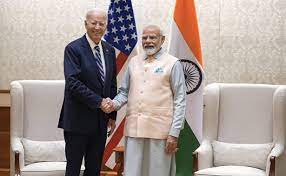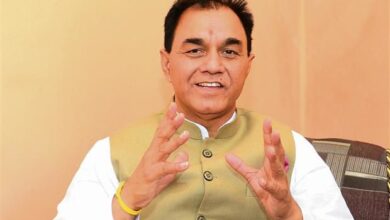Highlights of the Modi and Biden Joint Statement on Artificial Intelligence, Defense, and Nuclear Energy
On the day of the G20 conference, US President Joe Biden and Indian Prime Minister Narendra Modi met separately in Delhi to discuss a range of issues, including technology, artificial intelligence, nuclear power, and defense.
Nothing remained unaffected, from nuclear energy cooperation to the beginning of business agreements for the production of GE F-414 jet engines in India.
The leaders carefully addressed collaborating to eliminate the gender digital gap as well as welcomed substantial defense agreements between India and the US.
Additionally, President Biden reiterated his support for an updated UN Security Council that includes India as a permanent member.
Following their bilateral conversations, the two leaders released a joint statement in which PM Modi expressed excitement about hosting the US President at the next Quad Leaders’ Summit in 2024, which will take place in India.
Highlights of the meeting between US President Biden and Indian Prime Minister Modi are as follows:
The deep and lasting relationship between the US and India was confirmed by Modi and Biden.
Regarding the G20 conference, both presidents reaffirmed their dedication to it and their faith in its results. They said that it would be our two nations’ biggest shared issue.
The success that our two nations have achieved is largely due to the common ideals of freedom, democracy, human rights, inclusiveness, pluralism, and equal opportunity for all people. The US and India reiterated that these values also enhance our partnership.
Following the US intention to join the IPOI in June 2023, India welcomed the US decision to co-lead the IPOI Pillar on Trade Connectivity and Maritime Transport.
In addition, they spoke on how technology may be used to strengthen US-Indian relations and create value chains and ecosystems that are open, accessible, secure, and resilient.
Additionally, Biden thanked PM Modi, ISRO scientists and engineers, and the historic landing of Chandrayaan-3 and Aditya-L1, India’s first solar mission.
The Memorandum of Understanding (MoU) between Bharat 6G Alliance and Next G Allianc was warmly welcomed by the two leaders.
The United States reaffirmed its commitment to cooperating with India in the quantum field. It was also acknowledged that the Indian Institute of Technology (IIT) Bombay has become a global partner of the Chicago Quantum Exchange.
The leaders applauded the signing of an Implementation Agreement between the Indian Department of Biotechnology and the U.S. National Science Foundation (NSF) to facilitate technical and scientific research cooperation in biotechnology and biomanufacturing technologies.
The leaders reaffirmed the significance of eliminating the gender gap in the digital economy. They took notice of the G20’s pledge to reduce the gender gap in the digital economy by 2030 and supported the Women in the Digital Economy Initiative.
In addition, the two reiterated their commitment to expanding their collaboration in new and developing fields like artificial intelligence (AI) and space to deepen and diversify the India-US Major Defence Partnership.
The start of discussions for a business deal between GE Aerospace and Hindustan Aeronautical Limited (HAL) to produce GE F-414 jet engines in India was also applauded.
The leaders welcomed the completion of the second Master Ship Repair Agreement, the most recent of which was signed in August of this year by the US Navy and Mazgaon Dock Shipbuilders, Ltd.
They also discussed the joint security concerns being addressed by the India-US Defence Acceleration Ecosystem (INDUS-X) team.
Additionally, President Biden supported India’s Defence Ministry’s proposal to purchase 31 General Atomics MQ-9B remotely piloted aircraft (16 Sky Guardian and 15 Sea Guardian).
Both of them also spoke on the need to increase nuclear energy potential for goals related to the climate, the energy transition, and new renewable energy partnerships.
The seventh and last unresolved World Trade Organization (WTO) dispute between India and the United States was applauded by the leaders.
The two leaders praised efforts to create an ambitious “Innovation Handshake” agenda for the India-US Commercial Dialogue, which will include two anchor events in the fall (one in India and one in the US), where our two countries will work together to bring start-ups, private equity, and venture capital firms.
The joint statement was released after “productive” meetings between Modi and Biden to strengthen bilateral economic and interpersonal ties, with the prime minister claiming that the relationship between India and the US would continue to play a significant role in advancing the interests of the world.
President Biden is making his first trip to India as US President. Donald Trump visited India for the last time in February 2020.







